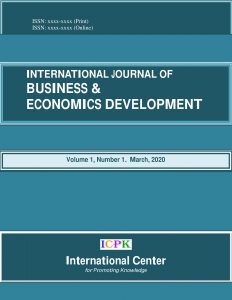Actual Issues of Electronic Commerce Development in the Republic of Uzbekistan
Isokhujaeva1 M.Ya. PhD
Abstract Preview
In the article there considered foreign experience in the development of electronic commerce on the basis of the study of scientific and methodological aspects of the organization and functioning of e-commerce system and revealed possibilities of its application in the Republic of Uzbekistan. There also studied factors affecting development of e-commerce and correlation-regression model of predicting the improvement of trade in virtual environment. There identified main directions of increasing the efficiency of e-commerce development in the country.
The Ways to Ensure the Financial Stability of Agriculture under Conditions of Modernization of the Economy
S.Mekhmonov & E. Ergashev
Abstract Preview
In the article the state of financial sustainability of agriculture in the country and the prospects for improving the mechanisms for financing the industry are analyzed. Also discussing about production of agricultural products in the agricultural sector of the country by working in harmony with national traditions, creation of unique competitive products, reporting on the natural location of territories, exporting them at the level of products that are in great demand both in the domestic and foreign markets. The reweals the ways to ensure the financial stability of agriculture under conditions of modernization of the economy of the Republic of Uzbeklistan and its improving ways.
Ways of Improving Credit Risk Management in the Activities of Commercial Banks
Kenjaev M.G.
Abstract Preview
The article identifies problems due to the improving the management of credit risks in the activities of commercial banks of the Republic of Uzbekistan, as well as, scientific proposals aimed at solving these problems were
developed.
The Main Issues of the International Monetary System
Kiumars Arya
Abstract Preview
Purpose – The purpose of this paper is to identify and express the currency challenges of the international monetary system and how to increase the efficiency of the system in the international financial markets.
Design/methodology/approach – Considering the dominant role of the US Dollar and European Euro in the international monetary system, most countries store these currencies as their foreign exchange reserve that has affected their exchange and monetary policies.
Findings – The results showed that the conflict of economic interests increased between large economies because the international monetary system does not have a significant mechanism to prevent the exchange rate’s manipulations and trade imbalance in the global economy. The currencies of the world’s superior economies, which can form the international currency basket along with the US Dollar are European Euro and Chinese Yuan. Gradually reducing US Dollar share in the international monetary system is necessary because the global economy’s role of China increase rapidly.
Research limitations/implications – The free-floating exchange rate system provides countries with the possibility of adopting their fiscal and monetary decisions with no pressure by the exchange market and proportionate with economic changes and indices inside the country. It eventually reduces the convergence of the economic goals.
Social implications – Particularly regarding the fact, that countries’ adherence to different economic goals, it will increase the problems of current account imbalances in the global economy.
Originality value – The increase of the International Monetary Fund’s supervisory role in the world’s exchange market. The foreign exchange policy must not only supply the interests of the national economy but also does not violate the economic interests of other countries.
